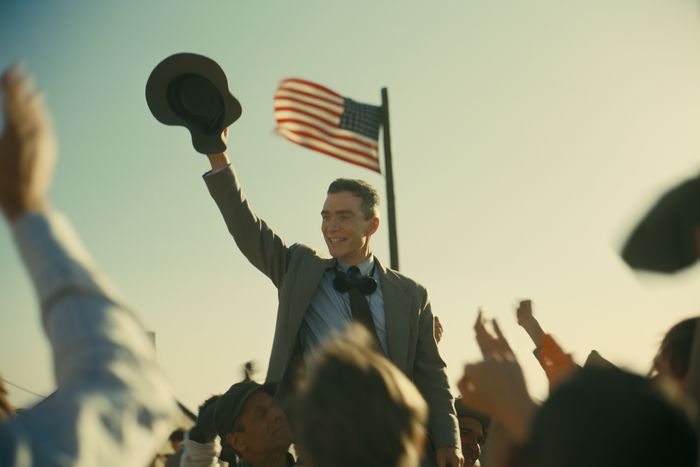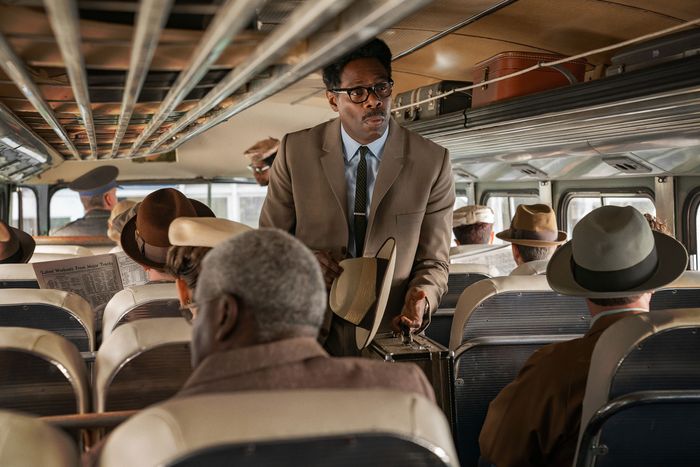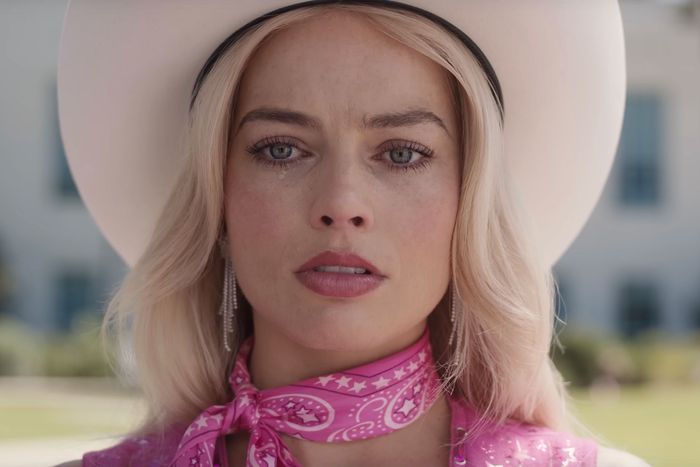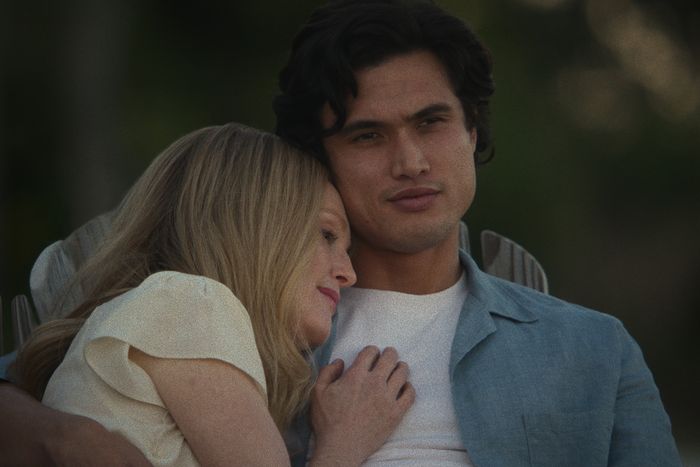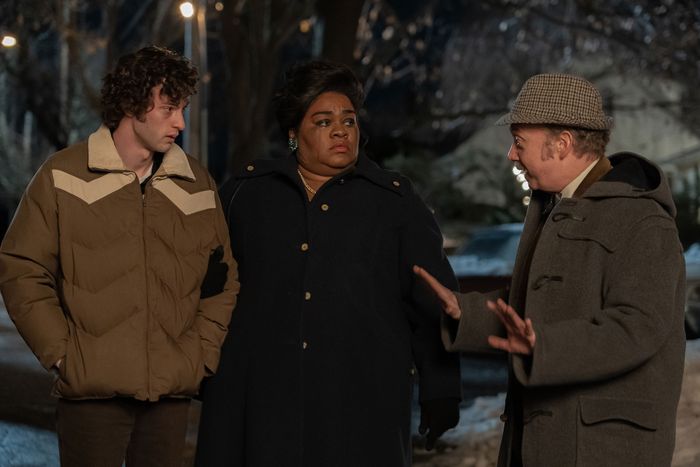
The Oscars are how Hollywood tells the story of itself, and was there any bigger story at the movies in 2023 than Barbenheimer? That two-headed colossus dominated the box office all summer long, proving it was indeed possible to marry art and commerce — as long as you involve beloved directors, recognizable IP, and access to monthslong marketing campaigns. The dozens of awards contenders hitting screens in the next few months — from a new Yorgos Lanthimos to Bradley Cooper’s Leonard Bernstein biopic to The Color Purple — will hope to create rival narratives. But they’ll have to operate in the shadow of an obstacle even more imposing than the blonde and the bomb: the as-yet-unresolved Screen Actors Guild strike.
Negotiations between the guild and the studios are currently in flux following the end of the Writers Guild of America strike, and no matter the outcome, the four-month-old work stoppage has put a wrench into the machinery of awards season. While the strike persists, we won’t see the kind of all-hands-on-deck charm offensives that powered CODA and Everything Everywhere All at Once to glory. The burden of promotion will instead lie heavily on directors, testing even the most charismatic auteurs, though multi-hyphenates like Cooper will be forced to sit on the sidelines still. Films from indie distributors like A24 and Neon, both of whom secured strike waivers, could gain an edge in the races as a result, as could foreign productions whose stars belong to Equity and other labor unions outside the U.S. But if you thought people raised an eyebrow at Andrea Riseborough’s self-funded Best Actress campaign last season, that’ll be nothing compared to the ire that greets a star who appears to be crossing the picket line.
It’s easy to forget that this season is also the first in which films will have to meet the Academy’s inclusion standards to be eligible, rules which have been simultaneously hailed as a bold step toward greater representation and too inconsequential for anyone to worry about. With all that uncertainty in mind, here’s my best (and extremely early) forecast of the state of the biggest Academy races.
Best Picture and Best Director
Both Barbie and Oppenheimer feel like locks for Best Picture nominations, and in the absence of Dune: Part Two, which has been delayed until March 2024, they’ll also compete to be the season’s overall nomination leader. (Oppenheimer has the edge in crafts, but don’t overlook Barbie’s multiple songs.) Throw in the romantic drama Past Lives, which was mooted as a potential Oscar contender upon its release in June and secured a strike waiver, a huge bump in the wistful indie’s effort to reintroduce itself. Let’s say that’s two and a half spots in the Best Picture lineup accounted for, or one-quarter. Who will fill the rest?
At the moment, the leading threat to Barbenheimer’s reign appears to be Yorgos Lanthimos’s Poor Things, a phantasmagorical picaresque starring Emma Stone that won the Golden Lion at Venice and could be the Greek auteur’s Shape of Water moment. Just as buzzy is Martin Scorsese’s Killers of the Flower Moon, which has been a staple of pundits’ predictions ever since it was announced, reuniting the director with muses Leonardo DiCaprio and Robert De Niro for a thematically rich tale of murder in the Osage Nation. Reviews have been effusive enough to suggest Killers will indeed be a player, though Oppenheimer has since stolen a bit of its “darkness at the root of the American soul” mojo.
Not since 2018 have we had a Best Picture lineup with no foreign-language films in the mix. Justine Triet’s perspective-shifting courtroom drama Anatomy of a Fall, which won the Palme d’Or at Cannes, originally seemed likely, but faces an uphill climb now that France decided to submit Tran Anh Hung’s food-porn extravaganza The Taste of Things instead. That in turn gave a boost to the U.K. submission, Jonathan Glazer’s The Zone of Interest, which is 100 minutes of Nazis making small talk and is absolutely riveting.
Venice also brought three biopics from Oscar-nominated filmmakers: Bradley Cooper’s Maestro, Sofia Coppola’s Priscilla, and Michael Mann’s Ferrari. Priscilla and Ferrari have interim agreements, allowing SAG members to promote those films, while Maestro does not. (Seeing how the Star Is Born campaign went, maybe that’s a good thing.) All earned mixed reactions on the Lido, though Maestro enjoyed a much better reception from the hometown crowd at the New York Film Festival.
The two big crowd-pleasers I saw at TIFF both have a shot. Cord Jefferson’s American Fiction, an of-the-moment satire about the pressures put on Black creatives, won the Audience Award, a prize that traditionally foreshadows a Best Picture nomination. Second place went to Alexander Payne’s The Holdovers, a shaggy ’70s period piece built around Paul Giamatti, which could get Payne back into the Academy’s good graces after the misfire of Downsizing. There may also be a place for Ava DuVernay’s Origin, which is the kind of movie only DuVernay would even try to make: She somehow turned Isabelle Wilkerson’s nonfiction best seller Caste into an Eat Pray Love for systemic oppression.
Other acclaimed festival titles include Todd Haynes’s May December, a campy dramedy inspired by the Mary Kay Letourneau case; Andrew Haigh’s ghost story All of Us Strangers, which is already being hyped as this year’s Aftersun; and Jeff Nichols’s biker-gang epic The Bikeriders (which got pushed from its release date but still plans to qualify). At Telluride, Emerald Fennell’s Saltburn was dinged as more style than substance, but there’s every chance viewers who aren’t cloistered on a mountaintop could find its posh provocations more thrilling. Same goes for David Fincher’s The Killer, which had the misfortune to play Venice opposite a much more likable assassin picture: Richard Linklater’s Hit Man, which might not come out this year.
Still to come are Ridley Scott’s Napoleon, a prequel to the coming-of-age comedy that thrilled Sundance in 2004; Sean Durkin’s The Iron Claw, the real-life tale of a purportedly cursed wrestling family; George Clooney’s rowing drama The Boys in the Boat; Matt Brown’s Freud’s Last Session, starring current Oscar good-luck charm Anthony Hopkins; and Blitz Bazawule’s musical version of The Color Purple. If there were any fears the latter’s Christmas release might be delayed due to the strike, those were seemingly assuaged when one of the film’s producers took up the promotional mantle last month — a woman named Oprah?
Still, nomination morning is a long way off. A year ago, who would have seen All Quiet on the Western Front getting in? I’ve heard passionate, if not always convincing, arguments for Air, Dumb Money, Asteroid City, and Spider-man: Across the Spider-Verse. With ten spots to fill, the safest bet is that there will be at least one surprise.
Best Actor
In a field stacked with Great Man biopics, one seat is reserved for Oppenheimer’s Cillian Murphy, who would become the first Best Actor winner to read Sanskrit while being ridden in cowgirl since Ben Kingsley in Gandhi. But he’ll have to fend off a bevy of past winners and nominees: Leonardo DiCaprio as a ne’er-do-well husband in Killers of the Flower Moon, Bradley Cooper as Leonard Bernstein in Maestro, and Paul Giamatti as a grumpy history teacher in The Holdovers. There’s also Adam Driver revving up his Italian accent in Ferrari, though pundits suggest the performance is slightly too cold for the Academy. I can attest to the warmth of Giamatti’s, which offers the Academy the chance to make up for snubbing him for Payne’s Sideways. Speaking of makeup, Cooper’s Maestro nose has already weathered an entire backlash cycle. Though with that particular Band-Aid already ripped off, perhaps the focus will now be on the other ways Cooper manages to conjure Leonard Bernstein — a transformation that could prove just the ticket for this oft-nominated actor.
Joining Murphy in the hunt for their first career nom are American Fiction’s Jeffrey Wright, who belongs to the “How has he never gotten in before?” camp, and Rustin’s Colman Domingo, whose Obama-produced biopic feels tailor-made to get him a nomination. (Hilariously, the civil-rights period piece Rustin is the exact type of project that would make Wright’s American Fiction author apoplectic.)
After those seven, the field gets fuzzy. Festival raves for All of Us Strangers suggest Andrew Scott could follow co-star Paul Mescal on the road from streaming-TV crush to Oscar nominee. Perhaps Joaquin Phoenix’s late charge with Napoleon will turn out more Austerlitz than Waterloo. Expect a dark-horse bid for Cannes Best Actor winner Koji Yakusho, who plays a Tokyo toilet cleaner living a life of quiet contemplation in Perfect Days, Japan’s Oscar submission. Finally, could Freud’s Last Session remind us all never to underestimate Anthony Hopkins in a movie based on a play?
Best Actress
It’s only October, but this race has already had a major shake-up: Killers of the Flower Moon’s Lily Gladstone will run in lead actress rather than supporting, as many pundits presumed. The Billions alum stars opposite DiCaprio as an Osage woman seeking justice for her family in a performance almost unanimously acclaimed as the beating heart of the film. That lead placement is a vote of confidence in Gladstone, who seems primed to become the first Native American actress ever nominated for an Oscar.
Her foremost competition appears to be Emma Stone, who’s earning career-best raves for her “shamelessly sexual” turn in Poor Things. Don’t forget the shamelessly asexual Barbie, Margot Robbie, either. On the biopic front, we have Annette Bening’s Diana Nyad in Nyad, who’ll have to navigate not just concerns the character of the marathon swimmer is too unlikable for voters, but also a recent L.A. Times story alleging the real Nyad inflated her record. Thankfully for Bening’s sake, Hilary Swank’s not in the race this year, though I don’t think she’ll be too pleased to see May December’s deliciously fake Natalie Portman, who beat her when they were matched up in 2011.
Long-suffering wives anchor the Supporting Actress race, but this year two of them step up into the big category. Sofia Coppola’s Priscilla is a rebuke to all those biopics where the wife gets sidelined — was there maybe one of those last year? — and star Cailee Spaeny took the Best Actress prize at Venice, which three of the past four winners have followed up with an Oscar nomination. On the more highbrow end of the musical spectrum, Carey Mulligan is first-billed in Maestro, which puts the conductor’s marriage center stage: Mulligan’s Felicia Bernstein may be the ultimate queer ally, to her own detriment.
Across the Atlantic, Sandra Hüller could be rewarded for starring in two of the buzziest international contenders, Anatomy of a Fall and Zone of Interest. (She’s expected to go lead in the former and supporting in the latter.) With International Feature no longer in play, the German actress could become the focus of Neon’s Anatomy campaign, and she’ll benefit from being one of the few actors able to hit the trail, as will Greta Lee of Past Lives.
Possible late-season entrants include Aunjanue Ellis-Taylor of Origin and Jodie Comer of The Bikeriders. But the majority of pundits are saving a seat for Fantasia Barrino of The Color Purple, who could become the second singer from her season of American Idol to win an Academy Award. When will Diana DeGarmo get her Oscar breakout?
Best Supporting Actor
The Supporting Actor field often takes a little while to gel. Not this year. Each of the putative Best Picture contenders boasts a showy supporting turn, and places are going fast. Both Oppenheimer’s Robert Downey Jr. and Barbie’s Ryan Gosling seem likely to make the final five, and those who’ve seen Killers of the Flower Moon say the same about Robert De Niro’s avuncular devil. Not to be outdone, Poor Things boasts two candidates: Mark Ruffalo’s unctuous cad and Willem Dafoe’s so-mad-he’s-sane scientist. Both getting in is eminently feasible, as this category has seen two actors from the same film nominated in each of the past four years.
As an emotionally stunted abuse victim, Riverdale’s Charles Melton holds his own against two Best Actress winners in May December, and newcomer Dominic Sessa makes a brash comic foil for Giamatti in The Holdovers. I could also see A24 make a play for low-key character actor John Magaro of Past Lives. All these hunks are hoping to be the new Paul Mescal, but the old Paul Mescal hasn’t gone away — he’s in All of Us Strangers.
Other coattail possibilities include Killers of the Flower Moon’s Jesse Plemons, who could once again score a supporting nom for a Western (though he’s apparently in less of the film than you’d expect). In the event that Oppenheimer sweeps the nominations, might we see Matt Damon sneak in there alongside Downey Jr.? Waiting in the wings is Colman Domingo, who could pull a Scarlett Johansson by getting his first two nominations in the same year: Rustin in lead and The Color Purple in supporting.
Want some funky surprises? Peter Sarsgaard won Best Actor at Venice for his understated turn as a dementia patient in Memory. Or how about Tom Hardy of The Bikeriders, Sterling K. Brown of American Fiction, or Ben Affleck for Air? There will surely be a campaign for Glenn Howerton of BlackBerry, which threw a party at TIFF just for the hell of it. Why not?
Best Supporting Actress
With Gladstone pulling a Michelle Williams, the Supporting Actress field is still coming into focus. With any justice, Da’Vine Joy Randolph, fresh off giving the best performance in The Idol, will be recognized for her mournful turn in The Holdovers. And if there’s one thing I’ve learned in my years of Oscar punditry, it’s that it’s rarely foolish to bet on wives. Perhaps voters will be drawn to Emily Blunt’s sozzled botanist in Oppenheimer, Julianne Moore’s camp queen in May December, or Penelope Cruz going big as Mrs. Ferrari?
I could see big things for Jodie Foster as a long-suffering coach in Nyad. Not only is her Bonnie Stoll the audience surrogate, she’ll get a boost from the fact that due to the strike, the real Stoll has become the face of the movie’s campaign. History says The Color Purple could be big here, too. The 1985 version earned Supporting Actress nominations for Margaret Avery and Oprah, whose roles are played in the new version by Taraji P. Hanson and Danielle Brooks, respectively. The latter is reprising the part that earned her a Tony nomination; luckily, there is no Hamilton in the Oscar race this year.
The good thing about an open race is there’s room for a potpourri of contenders. I’ve heard Rosamund Pike makes a meal of her role in Saltburn, to the extent that some reviews resort to just listing her best lines. Based on the trailer, Vanessa Kirby’s Josephine will get plenty to do in Napoleon. If Air is going to contend, it’ll likely be for Viola Davis’s steely turn as Michael Jordan’s mother. On the subject of moms, Barbie’s America Ferrera has the mother of all Oscar clips. And with a weaker field, this could be the place where Zone of Interest’s Sandra Hüller pops up. Hüller? They hardly know ’er — yet.



